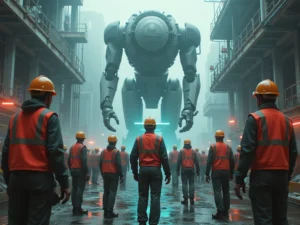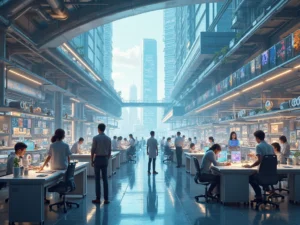What jobs will AI replace? This is one of the biggest questions in today’s fast-changing job market. AI is already automating tasks, improving efficiency, and reshaping industries—but what does that mean for your career?
AI is transforming the job market by automating repetitive, rule-based, and data-driven tasks. While AI will replace some jobs, it will also create new ones. Here are the jobs most at risk of being replaced or significantly altered by AI in the near future:
1. Jobs Most Likely to Be Replaced by AI
- Data Entry Clerks – AI can process and input data faster and more accurately.
- Telemarketers & Basic Customer Service Reps – AI chatbots (like ChatGPT) and voice bots handle routine inquiries.
- Bookkeepers & Accounting Clerks – AI automates invoicing, payroll, and financial reporting.
- Manufacturing & Assembly Line Workers – Robots and AI-driven machines are already replacing manual labor.
- Basic Coders & Programmers (for simple tasks) – AI tools like GitHub Copilot can write and debug code.
- Bank Tellers & Loan Officers – AI handles transactions, fraud detection, and loan approvals.
- Retail Cashiers – Self-checkout systems and AI-powered stores (like Amazon Go) reduce the need for human cashiers.
- Routine Healthcare Diagnosticians (e.g., Radiology Analysts) – AI can analyze X-rays, MRIs, and lab results faster than humans.
- Legal Assistants (for document review) – AI scans contracts and legal documents for key details.
- Translators (for common languages) – AI translation (DeepL, Google Translate) is improving rapidly.
2. Jobs AI Will Augment (Not Fully Replace)
- Doctors & Surgeons – AI assists in diagnostics, but human judgment remains crucial.
- Teachers & Trainers – AI personalizes learning but can’t replace human mentorship.
- Writers & Journalists – AI generates content, but humans provide creativity and nuance.
- Financial Analysts – AI processes data, but humans make strategic decisions.
- HR Recruiters – AI screens resumes, but human intuition is needed for hiring.
- Marketing Specialists – AI optimizes ads, but humans craft emotional campaigns.
- Engineers & Architects – AI aids design, but creativity and oversight are human-led.
3. Jobs Least Likely to Be Replaced by AI
- Creative Roles (Artists, Musicians, Novelists) – AI can assist but not replicate human creativity.
- Skilled Trades (Plumbers, Electricians, Mechanics) – Physical dexterity and problem-solving are hard to automate.
- Mental Health Professionals (Therapists, Psychologists) – Human empathy is irreplaceable.
- Senior Executives & Strategists – High-level decision-making requires human intuition.
- Emergency Responders (Firefighters, Police) – Complex, unpredictable environments require human judgment.
Jobs AI Will Replace (High-Risk Roles)

Artificial intelligence is transforming the workforce, and certain jobs face higher risks of automation. These roles typically involve repetitive tasks, predictable patterns, or data processing that AI can handle more efficiently.
Administrative and Office Support Roles
- Data entry clerks face replacement as AI systems can input and organize information faster with fewer errors
- Bookkeepers and accounting assistants may see reduced demand with automated financial software handling invoices and payroll
- Receptionists and basic customer service roles are increasingly handled by AI chatbots and virtual assistants
Manufacturing and Production Jobs
- Assembly line workers in factories are being replaced by robotic systems that work faster with perfect precision
- Quality control inspectors are being supplemented by computer vision systems that detect defects instantly
Retail and Food Service Positions
- Cashiers are becoming less necessary with the rise of self-checkout systems and cashier-less stores
- Fast food cooks and preparers face automation through robotic cooking systems and food assembly machines
Transportation and Delivery Jobs
- Truck drivers may see reduced opportunities as autonomous vehicle technology improves
- Warehouse workers are being replaced by robotic picking and packing systems
Basic Analytical Roles
- Entry-level paralegals and legal assistants handling document review are being supplemented by AI analysis tools
- Junior financial analysts performing routine data processing are seeing automation of their core tasks
The common thread among these high-risk jobs is their reliance on repetitive, rules-based tasks that AI and robotics can perform with greater speed, accuracy, and consistency. Workers in these fields should consider upskilling in areas that require human judgment, creativity, or emotional intelligence to remain competitive in the evolving job market.
What Jobs Will AI Replace? The answer becomes clearer as we see these patterns of automation across industries. While these changes may cause disruption, they also create opportunities for workers to transition into more complex, rewarding roles that leverage uniquely human capabilities.
Jobs AI Will Change (But Not Fully Replace)
The rise of artificial intelligence is transforming many professions, but some jobs will evolve rather than disappear entirely. While AI can handle repetitive tasks and data analysis, certain roles require human skills that machines can’t replicate.
Healthcare Professionals Will Work With AI
Doctors and nurses will increasingly use AI as an assistant rather than a replacement. AI can help with diagnostics and patient monitoring, but human judgment, empathy, and complex decision-making remain essential in healthcare.
Creative Professionals Will Use AI as a Tool
Writers, designers, and artists may incorporate AI into their workflows for inspiration or efficiency. However, true creativity, emotional depth, and unique perspectives still come from human minds. AI can generate content, but it lacks the ability to create with genuine originality.
Skilled Trades Require Human Expertise
Jobs like electricians, plumbers, and mechanics involve problem-solving in unpredictable environments. While AI can assist with diagnostics, the hands-on skills and adaptability needed in these fields make them resistant to full automation.
Management and Leadership Will Evolve
AI can provide data-driven insights, but leadership requires emotional intelligence, strategic vision, and the ability to motivate teams. Managers who embrace AI as a decision-support tool will thrive, while those who resist may fall behind.
Education and Training Will Adapt
Teachers and trainers will use AI for personalized learning, but human mentorship, encouragement, and critical thinking guidance cannot be replaced. The best educators will blend technology with human connection.
Future-Proof Jobs AI Won’t Replace

The rise of artificial intelligence has many workers wondering what jobs will AI replace. While automation will transform certain industries, some careers remain secure because they rely on uniquely human skills that machines can’t replicate.
Jobs Safe From AI Disruption
These professions are considered future-proof because they require:
- Complex emotional intelligence
- Creative problem-solving
- Physical dexterity and adaptability
- High-level strategic thinking
Healthcare Roles That Need a Human Touch
Medical professionals remain essential because patients need human care:
- Doctors and surgeons combine technical knowledge with bedside manner
- Nurses provide emotional support during treatment
- Physical therapists guide patients through personalized recovery
- Mental health professionals offer counseling and therapy
Creative and Technical Professions
AI struggles with true creativity and innovation:
- Artists and designers create original visual concepts
- Writers develop unique narratives and storytelling
- Musicians compose and perform with emotional depth
- Architects blend functionality with artistic vision
Skilled Trades Requiring Physical Expertise
Hands-on jobs remain difficult to automate completely:
- Electricians solve wiring problems in varied environments
- Plumbers handle unpredictable pipe systems and repairs
- Auto mechanics diagnose complex vehicle issues
- Construction workers adapt to changing job site conditions
Leadership and Management Positions
Strategic decision-making still requires human judgment:
- CEOs set company vision and culture
- Project managers coordinate teams and resources
- Human resources professionals handle workplace dynamics
- Business consultants provide tailored organizational advice
When considering what jobs will AI replace, it’s important to focus on developing skills that complement rather than compete with artificial intelligence. The most secure careers combine technical knowledge with interpersonal abilities that machines cannot replicate.
The Future of Work with AI
- Upskilling is Key: Jobs will evolve, requiring workers to adapt by learning AI tools.
- New Jobs Will Emerge: AI trainers, ethicists, and maintenance specialists will be in demand.
- Human-AI Collaboration: The best outcomes will come from humans working alongside AI.
How to Stay Ahead in the AI Era
The rise of AI is transforming the job market, but instead of fearing it, you can use it to your advantage. Here’s how to stay ahead in the AI era and ensure your skills remain in demand.
1. Develop Skills AI Can’t Replace
AI excels at repetitive tasks, but human skills are still irreplaceable. Focus on building:
- Critical thinking – AI provides data, but humans analyze and make decisions.
- Creativity – Innovation and original ideas are uniquely human.
- Emotional intelligence – Jobs requiring empathy, like counseling or leadership, will thrive.
- Complex problem-solving – AI follows rules, but humans adapt to unexpected challenges.
2. Learn to Work With AI
Instead of competing with AI, learn how to use it effectively:
- Upskill in AI tools – Familiarize yourself with platforms like ChatGPT, Copilot, or data analysis software.
- Automate repetitive tasks – Use AI to handle administrative work, freeing time for strategic thinking.
- Stay updated on AI trends – Follow industry news to anticipate shifts in your field.
3. Shift to High-Demand Roles
Some careers will grow as AI changes the workforce. Consider transitioning into:
- AI training and supervision – Teaching AI systems and ensuring ethical use.
- Hybrid tech-human roles – Combining technical skills with human judgment (e.g., AI-assisted healthcare).
- Creative and managerial positions – Where human insight is irreplaceable.
4. Embrace Lifelong Learning
The job market will keep evolving, so adaptability is key:
- Take online courses – Platforms like Coursera and Udemy offer AI and soft skills training.
- Attend workshops and webinars – Stay ahead of industry changes.
- Network with professionals – Learn from others navigating the AI shift.
5. Focus on Human-Centric Careers
Jobs requiring personal interaction, creativity, or ethical oversight will remain secure:
- Healthcare providers – AI aids diagnosis, but patient care needs human touch.
- Educators and trainers – Personalized learning requires human adaptability.
- Skilled trades – Hands-on work like plumbing or electrical repair is hard to automate.
FAQ: What Jobs Will AI Replace?
Will AI replace all jobs?
No, AI will primarily automate repetitive and predictable tasks. Jobs requiring creativity, emotional intelligence, and complex decision-making will remain in demand.
Which jobs are most at risk from AI?
Roles involving data entry, basic customer service, manufacturing assembly, and routine financial tasks are most vulnerable to AI replacement.
Can AI replace healthcare workers?
AI can assist with diagnostics and data analysis, but doctors, nurses, and therapists require human judgment and empathy that AI cannot replicate.
What jobs are safe from AI?
Creative professions (artists, writers), skilled trades (electricians, plumbers), and leadership roles are among the safest from AI disruption.
How can I protect my career from AI?
Focus on developing uniquely human skills like critical thinking, creativity, and emotional intelligence. Learning to work with AI tools can also make you more valuable.
Will AI create new jobs?
Yes, AI will create new roles like AI trainers, ethics specialists, and hybrid positions that combine technical and human skills.
How fast will AI replace jobs?
The timeline varies by industry, but significant changes are expected within the next 5-10 years as AI technology advances.
Can AI replace teachers?
While AI can assist with personalized learning, teaching requires human connection, adaptability, and mentorship that AI cannot provide.
Also Read: How Do AI Detectors Work
Final Thoughts: What Jobs Will AI Replace?
The rise of AI is transforming our workforce, but it’s important to remember that not all jobs will disappear. While AI will automate many routine and repetitive tasks, it will also create new opportunities we can’t yet imagine. The key is understanding which roles are most vulnerable and how we can adapt.
Jobs involving predictable, rule-based work like data entry, basic customer service, and simple manufacturing tasks are most at risk. However, careers requiring human creativity, emotional intelligence, and complex problem-solving will remain essential. Healthcare providers, educators, skilled tradespeople, and creative professionals will continue to play vital roles in our society.
Rather than fearing AI, we should focus on how to work alongside it. By developing skills that complement AI rather than compete with it, we can future-proof our careers. This means emphasizing critical thinking, adaptability, and the human touch that machines can’t replicate.
The future of work isn’t about humans versus machines – it’s about humans and machines working together. As AI handles more routine tasks, we’ll have more opportunities to focus on meaningful, creative, and interpersonal work that truly makes a difference.






